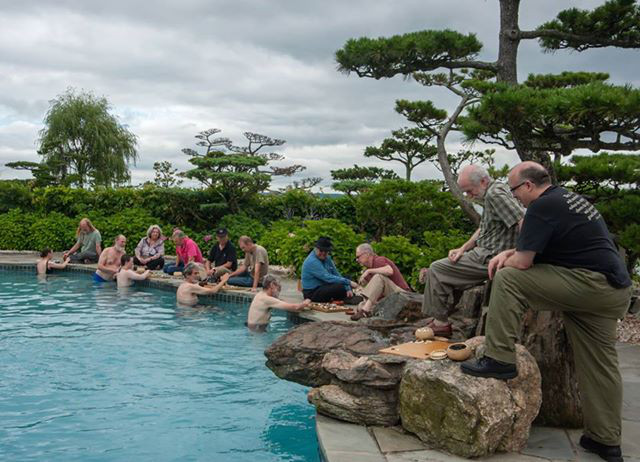| Navigation |
|---|
| Home |
| Christmas Newsletters |
| Site index |
| 2014 newsletter |
Following my return from Korea and Japan, I gave myself a jetlag week and then set off for the USA. Where I needed more jetlag time, spent at Weston near Boston with my friends Marvin and Katherine. Marvin is a member of that extraordinary set of go players who donít play go, and Katherine is an ex-go organiser. I did what I could to remedy the situation, and after fulfilling a musical commitment in Boston caught the train to New York, to attend my tenth US Go Congress.
All previous US Congresses have been held in universities. There had been a plan to hold the congress for the first time outside the USA, in Vancouver. But the Canadian Go Association couldnít muster the necessary volunteers, and so for the first time it was held in a hotel in Manhattan. A reasonable deal had been struck, so that the accommodation was not over-expensive; at any rate, numbers held up well compared with previous congresses.
The Pennsylvania Hotel itself was the one made famous by Glen Miller with his number Pennsylvania 65000, which apparently remains its telephone number. We played in a meeting room on the 18th floor. I certainly appreciated having a more comfortable room than those at some universities, and being only a lift ride away from the action. The main tournament, the US Open, had six rounds played in the mornings. Then there were the usual raft of side events; self paired games, pro lectures and teaching in the afternoons, and side tournaments in the evenings.
The organisation was generally pretty good, especially for the evening events. The American Draw, which I have written about before, means that there is usually only a short wait before starting, and you donít have to register in advance; you can decide to play or not at the last minute. I find it odd that this good system has never caught on in Europe. There was one hiccup; unfortunately the system was not used for the Pair Go on Thursday evening, and in consequence we had a near 90 minute wait before starting. Thatís pretty unusual for the AGA.
One impressive aspect of the event was the array of events for young go players, and the number of participants. The Americans are way ahead of us in this respect. Have you heard of relay go? You run from a starting line to the go board, play your move, run back and tag your opponent. Then the opponent runs, moves, runs back and so on. It is of course against the clock. No, I wouldnít want to play it, but it entertains the young.
Wednesday was the off day, as it is at European Congresses. There was a Die-hard Tournament for the real junkies. I was invited to a country house party in Connecticut, and advised to bring swimming things. At the house, with its fine seaside garden and pool, I was inveigled into a series of games where one player was in the water. No, it wasnít my opponent.
You didnít have any choice about the grade that you entered at, and my AGA rating remains at 4 dan. That is way above my European rating, but if you try to persuade the organisers to allow you to enter at a lower grade, they call you a sandbagger. Which isnít very nice, so at 4 dan I entered, and was quite pleased to end with 3/6 in the US Open. I won no prize for that, but I did come home with a bottle of wine for my entry in the Bob High song competition, which appears elsewhere. The singing of go songs is a tradition alive and well in the US. We had our session on the final Saturday night.
I have written before about inter-continental amateur grade disparity. The world of go is awash with mathematicians and programmers. I do find it strange that their collective wisdom cannot devise a stable world rating system for amateurs, or at least a rate of exchange between continents. I do recommend the US Congress. It lasts only a week, but it has many compensating advantages compared with the European. I now have friends all over the USA, and hope to be back for my eleventh congress before too long.
 |
| Swimming pool go |
| |